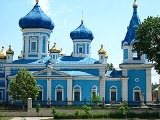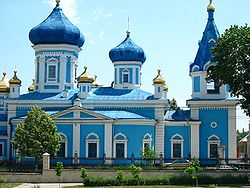
Religion in Moldova
Encyclopedia
Religion in Moldova is separate from the state in that it is much different from any other state religion in Western Europe. The Constitution of the Republic of Moldova provides for freedom of religion, and the national government generally respects this right in practice; however, the law includes restrictions that at times may inhibit the activities of some religious groups.
The generally amicable relationship among religions in Moldovan society contributes to religious freedom; however, disputes among various branches of the Christian Orthodox
faith continue.
 The primary religion is Christianity
The primary religion is Christianity
, 90% of the population nominally being Eastern Orthodox
. Administratively, there are two autonomous
churches belonging to two autocephalous
churches (Russian and Romanian) within the Eastern Orthodox communion
. The autonomous Metropolis of Chişinău and Moldova (belonging to the Russian Orthodox Church
), according to the State Service on Religious Issues, has 1,194 parishes; the Metropolis of Bessarabia
(belonging to the Romanian Orthodox Church
) has 124 parishes. In addition followers of the Old Rite Russian Orthodox Church (Old Believers
) make up approximately 3.6 percent of the population. The religious traditions of the Eastern Orthodoxy are entwined with the culture and patrimony of the country. Many self-professed atheists routinely celebrate religious holidays, cross themselves, and even light candles and kiss icons if local tradition and the occasion demand.
Adherents of other faiths include Roman Catholics
, Baptists, Pentecostals, Seventh-day Adventists
, Muslims
, Jehovah's Witnesses
, Bahá'ís
, Jews
, Unification Church
members, Molocans (a Russian group), Messianic Jews
(who believe that Jesus was the Messiah), Lutherans, Presbyterians, Hare Krishnas
, and some other charismatic Christian and evangelical Christian groups. The Church of Jesus Christ of Latter-day Saints (Mormons) has 2 congregations, and a combined total of approximately 250 members. According to the most recently available numbers, the Jewish community has approximately 31,300 members, including approximately 20,000 living in Chişinău
; 3,100 in Bălți
and surrounding areas; 2,200 in Tiraspol
; 2,000 in Bender
; and 4,000 in small towns.
Foreign missionaries represent many faiths and denominations.
The generally amicable relationship among religions in Moldovan society contributes to religious freedom; however, disputes among various branches of the Christian Orthodox
Eastern Orthodox Church
The Orthodox Church, officially called the Orthodox Catholic Church and commonly referred to as the Eastern Orthodox Church, is the second largest Christian denomination in the world, with an estimated 300 million adherents mainly in the countries of Belarus, Bulgaria, Cyprus, Georgia, Greece,...
faith continue.
Religious demography

Christianity
Christianity is a monotheistic religion based on the life and teachings of Jesus as presented in canonical gospels and other New Testament writings...
, 90% of the population nominally being Eastern Orthodox
Eastern Orthodox Church
The Orthodox Church, officially called the Orthodox Catholic Church and commonly referred to as the Eastern Orthodox Church, is the second largest Christian denomination in the world, with an estimated 300 million adherents mainly in the countries of Belarus, Bulgaria, Cyprus, Georgia, Greece,...
. Administratively, there are two autonomous
Autocephaly
Autocephaly , in hierarchical Christian churches and especially Eastern Orthodox and Oriental Orthodox churches, is the status of a hierarchical church whose head bishop does not report to any higher-ranking bishop...
churches belonging to two autocephalous
Autocephaly
Autocephaly , in hierarchical Christian churches and especially Eastern Orthodox and Oriental Orthodox churches, is the status of a hierarchical church whose head bishop does not report to any higher-ranking bishop...
churches (Russian and Romanian) within the Eastern Orthodox communion
Full communion
In Christian ecclesiology, full communion is a relationship between church organizations or groups that mutually recognize their sharing the essential doctrines....
. The autonomous Metropolis of Chişinău and Moldova (belonging to the Russian Orthodox Church
Russian Orthodox Church
The Russian Orthodox Church or, alternatively, the Moscow Patriarchate The ROC is often said to be the largest of the Eastern Orthodox churches in the world; including all the autocephalous churches under its umbrella, its adherents number over 150 million worldwide—about half of the 300 million...
), according to the State Service on Religious Issues, has 1,194 parishes; the Metropolis of Bessarabia
Metropolis of Bessarabia
The Metropolis of Bessarabia is an autonomous Eastern Orthodox Metropolitan bishopric of the Romanian Orthodox Church. The Metropolis of Bessarabia was created in 1923 and organized in 1925, when the Archbishopric of Chișinău was raised to the rank of metropolis...
(belonging to the Romanian Orthodox Church
Romanian Orthodox Church
The Romanian Orthodox Church is an autocephalous Eastern Orthodox church. It is in full communion with other Eastern Orthodox churches, and is ranked seventh in order of precedence. The Primate of the church has the title of Patriarch...
) has 124 parishes. In addition followers of the Old Rite Russian Orthodox Church (Old Believers
Old Believers
In the context of Russian Orthodox church history, the Old Believers separated after 1666 from the official Russian Orthodox Church as a protest against church reforms introduced by Patriarch Nikon between 1652–66...
) make up approximately 3.6 percent of the population. The religious traditions of the Eastern Orthodoxy are entwined with the culture and patrimony of the country. Many self-professed atheists routinely celebrate religious holidays, cross themselves, and even light candles and kiss icons if local tradition and the occasion demand.
Adherents of other faiths include Roman Catholics
Roman Catholic Church
The Catholic Church, also known as the Roman Catholic Church, is the world's largest Christian church, with over a billion members. Led by the Pope, it defines its mission as spreading the gospel of Jesus Christ, administering the sacraments and exercising charity...
, Baptists, Pentecostals, Seventh-day Adventists
Seventh-day Adventist Church
The Seventh-day Adventist Church is a Protestant Christian denomination distinguished by its observance of Saturday, the original seventh day of the Judeo-Christian week, as the Sabbath, and by its emphasis on the imminent second coming of Jesus Christ...
, Muslims
Islam
Islam . The most common are and . : Arabic pronunciation varies regionally. The first vowel ranges from ~~. The second vowel ranges from ~~~...
, Jehovah's Witnesses
Jehovah's Witnesses
Jehovah's Witnesses is a millenarian restorationist Christian denomination with nontrinitarian beliefs distinct from mainstream Christianity. The religion reports worldwide membership of over 7 million adherents involved in evangelism, convention attendance of over 12 million, and annual...
, Bahá'ís
Bahá'í Faith
The Bahá'í Faith is a monotheistic religion founded by Bahá'u'lláh in 19th-century Persia, emphasizing the spiritual unity of all humankind. There are an estimated five to six million Bahá'ís around the world in more than 200 countries and territories....
, Jews
Judaism
Judaism ) is the "religion, philosophy, and way of life" of the Jewish people...
, Unification Church
Unification Church
The Unification Church is a new religious movement founded by Korean religious leader Sun Myung Moon. In 1954, the Unification Church was formally and legally established in Seoul, South Korea, as The Holy Spirit Association for the Unification of World Christianity . In 1994, Moon gave the church...
members, Molocans (a Russian group), Messianic Jews
Messianic Judaism
Messianic Judaism is a syncretic religious movement that arose in the 1960s and 70s. It blends evangelical Christian theology with elements of Jewish terminology and ritual....
(who believe that Jesus was the Messiah), Lutherans, Presbyterians, Hare Krishnas
International Society for Krishna Consciousness
The International Society for Krishna Consciousness , known colloquially as the Hare Krishna movement, is a Gaudiya Vaishnava religious organization. It was founded in 1966 in New York City by A.C. Bhaktivedanta Swami Prabhupada...
, and some other charismatic Christian and evangelical Christian groups. The Church of Jesus Christ of Latter-day Saints (Mormons) has 2 congregations, and a combined total of approximately 250 members. According to the most recently available numbers, the Jewish community has approximately 31,300 members, including approximately 20,000 living in Chişinău
Chisinau
Chișinău is the capital and largest municipality of Moldova. It is also its main industrial and commercial centre and is located in the middle of the country, on the river Bîc...
; 3,100 in Bălți
Balti
Balti can refer to:* Balti language, a language spoken in Baltistan in Pakistan and Ladakh in Kashmir* Balti people, Muslims of Ladakhi/Tibetan origin from Baltistan in Pakistan and Ladakh in Kashmir...
and surrounding areas; 2,200 in Tiraspol
Tiraspol
Tiraspol is the second largest city in Moldova and is the capital and administrative centre of the unrecognized Pridnestrovian Moldavian Republic . The city is located on the eastern bank of the Dniester River...
; 2,000 in Bender
Bender, Moldova
Bender or Bendery, also known as Tighina is a city within the internationally recognized borders of Moldova under de facto control of the unrecognized Transnistria Republic since 1992...
; and 4,000 in small towns.
Foreign missionaries represent many faiths and denominations.
Freedom of religion
The Constitution provides for freedom of religion, and the Government generally respects this right in practice; however, the 1992 Law on Religions, which codifies religious freedoms, contains restrictions that inhibit the activities of unregistered religious groups. Although the law was amended in 2002, many of the restrictions remain in place. The law provides for freedom of religious practice, including each person's right to profess his or her religion in any form. It also protects the confidentiality of the confessional, allows denominations to establish associations and foundations, and states that the Government may not interfere in the religious activities of denominations. The law specifies that "in order to organize and function", religious organizations must be registered with the Government, and unregistered groups may not own property, engage employees, or obtain space in public cemeteries in their own names.See also
- Islam in MoldovaIslam in MoldovaAccording to the US Department of State, there is a small community of Muslims in Moldova, numbering a few thousand.In 2005 the Spiritual Organisation of Muslims in Moldova headed by Talgat Masaev was denied registration despite of the appeal of the Mission to Moldova of the Organisation for...
- History of the Jews in MoldovaHistory of the Jews in MoldovaThe History of the Jews in Moldova reaches back centuries in history. Bessarabian Jews have been living in the area for quite some time.-Early history:* 1889: There were 180,918 Jews of a total population of 1,628,867 in Bessarabia....
- Religion by country
- Roman Catholicism in MoldovaRoman Catholicism in MoldovaThe Roman Catholic Church in Moldova is part of the worldwide Roman Catholic Church, under the spiritual leadership of the Pope and curia in Rome.-Statistics:...
- Bahá'í Faith in MoldovaBahá'í Faith in MoldovaThe Bahá'í Faith in Moldova began during the policy of oppression of religion in the former Soviet Union. Before that time, Moldova, as part of the Russian Empire, would have had indirect contact with the Bahá'í Faith as far back as 1847. In 1974 the first Bahá'í arrived in Moldova...
- Slavic NeopaganismSlavic NeopaganismSlavic Neopaganism is a modern fakeloric, polytheistic, reconstructionistic, and Neopagan religion; its adherents call themselves Rodnovers , and consider themselves to be the legitimate continuation of pre-Christian Slavic religion.- Rebirth of Slavic spirituality :The pre-Christian religions...
.

